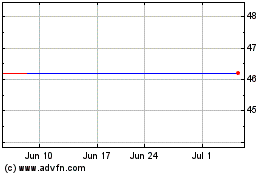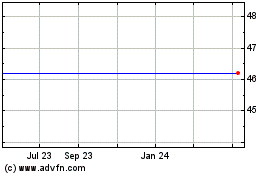Krone Strengthens As Norges Bank Surprises Market Again
March 30 2012 - 9:29AM
Dow Jones News
Norway's central bank resisted the temptation to increase its
oil fund's purchases of foreign exchange for April Friday, giving
investors fresh reason to buy the krone after it wrong-footed
markets earlier this month with an interest rate cut designed to
stymie the currency's strength.
The euro fell against the Norwegian krone by 0.6% to as low as
NOK7.5900 and the krone firmed against the Swedish krona, pushing
toward SEK1.165 after Norges Bank announced it would keep its
purchase of foreign exchange in April at NOK350 million a day,
continuing the same pace seen since January.
Some investors had expected the central bank to up its purchases
to at least NOK500 million a day.
"Several banks had made the case that the Norges Bank would
increase their purchases to weaken the currency but this didn't
happen," said currency strategist Richard Falkenhall at SEB AB
(SEB-A.SK) in Stockholm.
Danske Bank A/S and Citigroup (C) were among the banks expecting
Norges Bank to up its purchases.
"We expect that the daily amount will rise from NOK350 million
in March to NOK500 million in April. The reason is higher tax
income in the first quarter and the still-high oil price," said
Danske Bank ahead of the Norges Bank decision.
Citigroup had suggested that an increase in purchases would be
used to keep up the pressure on the strong krone. After the
decision, the bank's currency strategist Valentin Marinov said the
lack of action was like an open invitation to currency traders to
buy the krone, not least because a robust set of Norwegian retail
sales figures published around the same time underlined just why
the Norwegian currency was in demand.
Data showed Norway's seasonally adjusted retail sales, excluding
motor vehicles, rose 1.0% on the month in February, showcasing the
country's healthy economic fundamentals just as the euro zone is
seen slipping into recession.
"What [the Norges Bank decision] means is there will be a very
slight headwind against krone inflows," said Michael Sneyd, a
currency strategist at BNP Paribas S.A. (BNP.FR).
The data also leaves the central bank in a bind. Having
surprised markets March 14 by cutting its key rate to 1.50% from
1.75%, it could be forced into an about-turn to temper excessive
credit growth after a series of above-target economic data
releases.
DNB Markets now think the interest rate could be hiked this
August.
At 1233 GMT, the euro traded at NOK7.6090 against the krone
while the krone traded at SEK1.1627.
-By Alexandra Fletcher, Dow Jones Newswires, 44 20 7842
9462;
alexandra.fletcher@dowjones.com @djfxtrader
DNB Financial (NASDAQ:DNBF)
Historical Stock Chart
From Mar 2024 to Apr 2024

DNB Financial (NASDAQ:DNBF)
Historical Stock Chart
From Apr 2023 to Apr 2024
